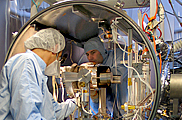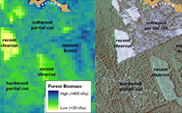New Hampshire NASA EPSCoR
In 2004, the National Science Foundation designated New Hampshire an EPSCoR state. That EPSCoR designation then qualified New Hampshire researchers and research jurisdictions to apply for EPSCoR funds from federal agencies with EPSCoR programs—NASA being one of those agencies.
New Hampshire NASA EPSCoR is administered through the New Hampshire Space Grant Office at the University of New Hampshire. Prof. Antoinette Galvin, Director of the NH Space Grant, is also the Director of NH NASA EPSCoR. The institutional lead for NASA EPSCoR RID at Dartmouth College is Prof. Robyn Millan.
UPCOMING DUE DATES
EPSCoR 3-year Research Proposal Only one proposal may be submitted per state or jurisdiction to NSPIRES. This requires a statewide competition for down-selection. The submissions for jurisdictional down-selection are limited to one submission per institution of higher learning within the state. The jurisdictional down-selection proposals will be accepted between July 1 00:00 (midnight) Eastern Time through August 1 00:01 (one minute past midnight) Eastern Time each year. Jurisdictional down-selection proposals are submitted to the NH NASA EPSCoR Director. More information below.
EPSCoR R3 are now handled directly through NSPIRES and not through the directorship office. Down selection is the responsibility of the submitting institution.
UNH RID Mini-award applications are due between February 1 and March 1 of each year, submitted to the UNH NASA EPSCoR Directorship. Amount of funding is variable and is restricted to UNH persons. Dartmouth RID mini-awards are handled separately through the Dartmouth institutional lead.
NASA EPSCoR Funding Opportunities
The NASA Established Program to Stimulate Competitive Research, or EPSCoR, is a merit-based program designed to strengthen research capabilities in jurisdictions not equably participating in competitive aerospace and aerospace-related research activities.
EPSCoR-eligible jurisdictions are offered funding to develop a more competitive research base among their member academic institutions.
Two primary initiatives of NASA EPSCoR are the RID and the Research CAN, but there are also secondary funding venues:
1. Research & Infrastructure Development (RID) Cooperative Agreements address enabling institutions of higher learning within the the jurisdiction to build and strengthen relationships with NASA researchers and jurisdictional industries. Typically up to $200,000 may be awarded by NASA per year to a given jurisdiction.
The RID proposal and award typically has a 3 to 5 year cycle. A one-to-one match (non-federal, cash or in-kind) is normally required for every NASA dollar awarded. Each funded NASA EPSCoR proposal should focus on building the core strength needed
to develop competitive research and technology development methods and activities for the solution of scientific and technical problems of importance to NASA as defined by one or more of the NASA
Mission Directorates and/or one or more of the NASA Centers. The jurisdictional proposal should demonstrate a contribution to the overall research infrastructure, science and technology capabilities, higher education, and economic development of the EPSCoR jurisdiction.
Only one proposal per jurisdiction may be submitted to NASA for a given RID solicitation. If selected, the NASA EPSCoR award is made to the institution of the NASA EPSCoR Director within the jurisdiction (currently UNH). Funding to other participating higher education institutions within the State of New Hampshire are through sub-awards from the Director's institution (UNH). Each participating institution within the RID proposal is responsible for providing match (amount as determined during the proposal process) as cost share for their portion of NASA funding, with the cost share guaranteed in writing by their responsible institutional representative (typically their office of sponsored research). The source for cost share shall be provided as part of their request for participation, and such cost share will be obligated to their institution under the sub-award process. Those institutions of higher learning within the jurisdiction who are interested in participating within the next RID proposal must contact the NH NASA EPSCoR Director's office before the deadline cited below.
A formal request to the NH NASA EPSCOR Director is required for participation in the New Hampshire RID proposal. The request to participate must be submitted to the jurisdiction's director's office before the next solicitation is released.
Important Dates RID FY22 Proposal Process:
The NASA RID solicitation (FY22-FY27) is now closed. Participating institutions are UNH and Dartmouth College.The NASA solicitation for the next RID is expected in the 2026 timeframe. Request by institutions of higher learning within New Hampshire to the jurisdictional Director for potential participation in the next solicitation will become known when the next NASA solicitation release date is announced.
............
RID mini-rewards at UNH:
Requests for internal University of New Hampshre (UNH) mini-awards (small infrastructure research projects with up to 6 month period of performance under existing RID) are accepted between February 1 and March 1st of each year. For details on these small awards, including eligibility, cost share requirements, and status of funding availability, please contact toni.galvin@unh.edu. For the most recent selection criteria, read more (pdf) and application cover form.
RID mini-rewards at Dartmouth College, Dept of Physics:
Please contact Dartmouth Prof. Robyn Millan (robyn.millan@dartmouth.edu)
............
Research Cooperative Agreements
2. Research Cooperative Agreements address high-priority NASA research and technology development needs. They are expected to establish research activities that will make significant contributions to strategic research and technology development priorities of one or more of the Mission Directorates and contribute to overall research infrastructure...the most recent call is available through NASA NSPIRES.
These research awards are typically up to $750,000 for a 3-year period. A 50% to 100% match (non-federal source of funds, cash or in-kind) is usually required for every NASA dollar awarded, but match requirements in each solicitation announcement may vary.
NASA intends to solicit EPSCoR Research Cooperative Agreements yearly, however this is pending available funding. For this reason, the date for the NASA solicitation changes every year. However, to maintain consistency with our jurisdiction, the NH jurisdiction down-selection solicitation is in the month of July timeframe each year.
All institutions of higher learning within the state of New Hampshire (the 'jurisdiction') are eligible to compete as the science lead investigator's institution, however as only one proposal may be submitted per jurisdiction, there is a down-selection process done through the NH NASA EPSCoR Director's office. Currently, NASA policy is to make the award PI the jurisdictional director, who then issues a sub-award to the proposal's Science Lead Investigator.
Because the PI-Manager is the jurisdictional director, there will be project administrative costs applied against the award amount. The amount of these administrative costs depend in part on how many sub-awards are involved. Note that the cost share for this administrative cost will be the responsibility of the Sc-I.
Timeline.
The open call for the jurisdictional selection occurs every July 1 00:00 ET through August 1 00:01 ET of each year. New Hampshire institutions of higher learning interested in competing for the NH jurisdictional down-selection under this open call must submit within this specified time interval. For further information on what is required and submittal details for the jurisdiction pre-proposal please see here. NASA EPSCoR Areas of Interest should be referenced within the mini-proposal.
The down-selection process will include merit and programmatic considerations.
Important Dates:
Submittal of Jurisdiction (NH)-proposal to Directorship office (toni.galvin@unh.edu) for the Open Call: July 1,00:00 ET, - August 1, 00:01, of each year.
Jursidictional down-selection process: ONE PROPOSAL WILL BE SELECTED STATUS: A few weeks after the NSPIRES announcement is received.
NOI to NASA: TBD after AO release
Proposal to NASA: TBD after AO release
............
3. Other Research Opportunities
EPSCoR also has other targeted opportunities, such as 'EPSCoR International Space Station (ISS) Flight Opportunity', the 'EPSCOR Rapid Response Research (R3)', and the 'Suborbital Flight Opportunity (SFO)'. See NASA ESPCoR or NASA NSPIRES for details.
Next R3 solicitation will be released through NSPIRES
Next ISS solicitation release occurred April 29, 2025. Please see in NSPIRES (https://nspires.nasaprs.com/external/solicitations/summary!init.do?solId={2914BB87- F7DD-E0F0-A5A8-C4ABFC7CED10}&path=open).
For jurisdiction pre-proposal guidelines please see here.
June 2, 2025: Jurisdictional (NH) Pre-proposal submission to NASA EPSCOR Directorship (toni.galvin@unh.edu CC: robyn.millan@dartmouth.edu )
NOTE: One and only one pre-proposal may be submitted by a given New Hampshire institute of higher learning for jurisdiction-level down-selection consideration. If multiple pre-proposals are received, they will be returned to the submitting institution.


